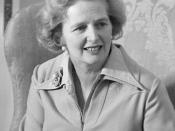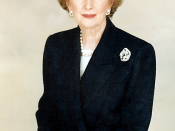The winter of 1978-1979 in Britain was characterized by widespread strikes by trade unions requesting larger wage increases for their members and struggles within the Labour Party. The first line of William ShakespeareÃÂs Richard III was applied to the industrial events happening during that time. The strikes were a result of the government ruling that pay rises must be limited to 5%. The strikes spread from the private sectors to public sectors, causing widespread problems in transportation, waste collection, and individual companies. More than one million workers went on strike, even surpassing the numbers in the General Strike in 1926. Although most of the issues were resolved, the Winter of Discontent the strikes had a profound impact on voting intentions when general elections rolled around in 1979, bringing about the Conservative PartyÃÂs victory under Margaret Thatcher.
Although the Labour government had been fighting inflation for several years, it had peaked at 26.9%
in August 1975. In an effort to curb inflation and avoid increases in unemployment, Prime Minister Harold WilsonÃÂs Labour government made an agreement with the Trades Union Council (TUC) to cap pay increases for workers at limits set by the government. In July of 1977, it was announced that there would be a phased return of collective bargaining, where employers could bargain employers for raises, would be allowed once again in the future. Inflation considerably declined by 1978 and a new limit of 5% was put on pay rises, which was rejected by both the TUC and the workers.
When Ford Motors set a pay increase of 5% in September of 1978, 15,000 Ford workers went on strike joined later by 57,000 others. The Transport and General Workers Union (TGWU) attempted to make negotiations with Ford and after several weeks. The TGWU agreed on a 17% increase,


